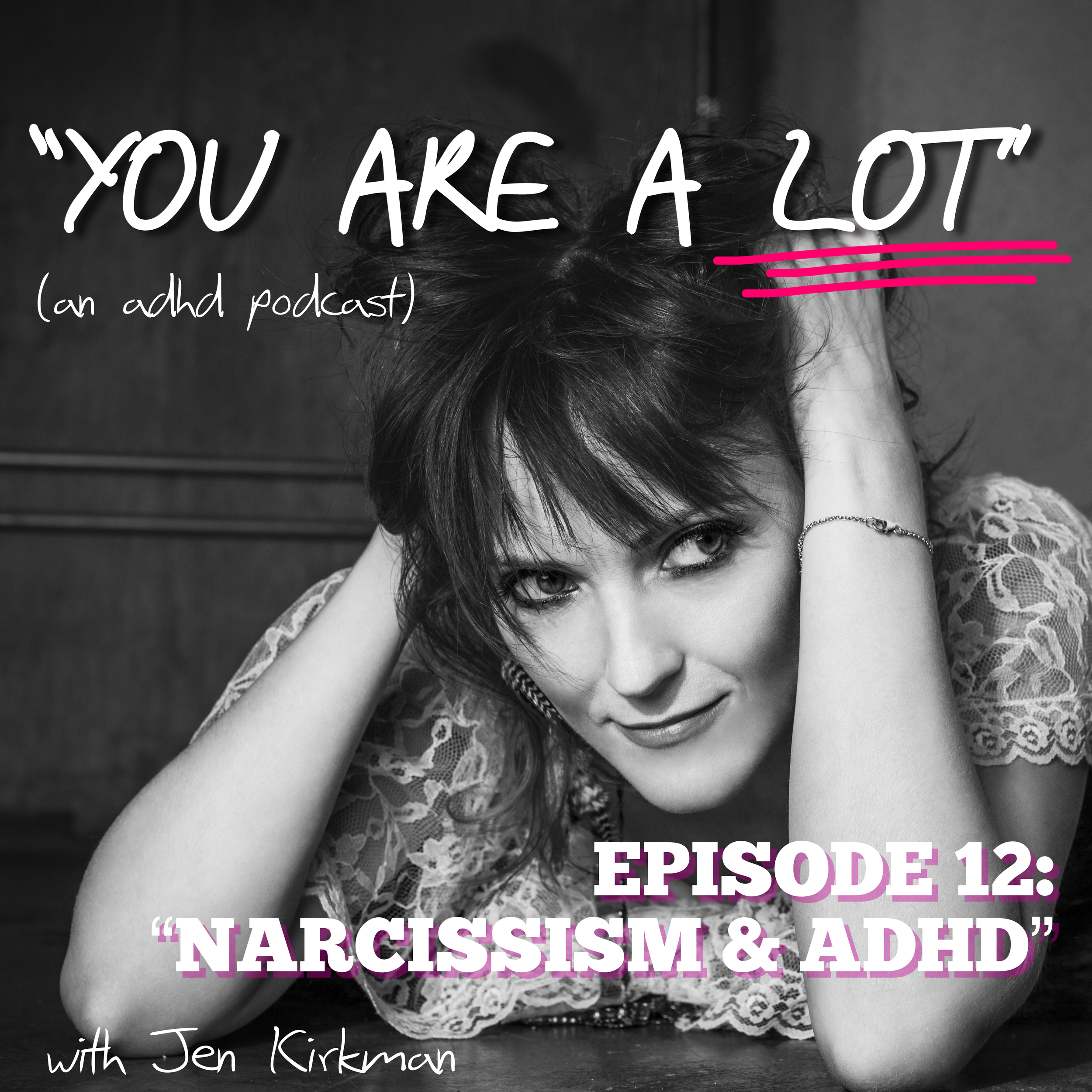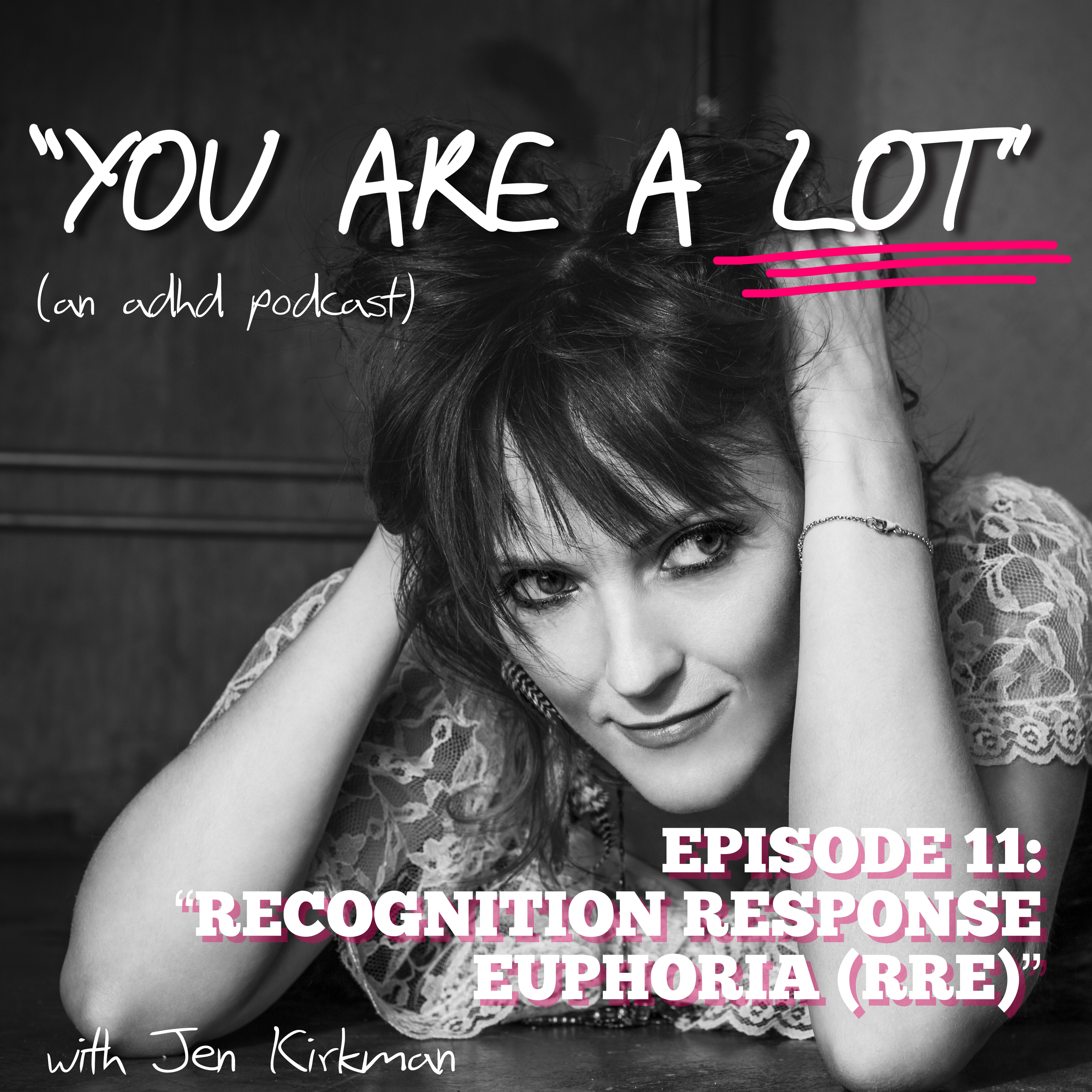“YOU ARE A LOT”
(an ADHD/AuDHD podcast)
On the You Are A Lot (an ADHD/AuDHD podcast), I talk about my personal experience of my later-in-life diagnosis of ADHD and Autism Spectrum Disorder, and I discuss the latest expert research. I aim to create an entertaining and affirming listen for neurodivergent people—helping us feel less confused, more connected, and, as a result, fully validated.
If you have ADHD/AuDHD or if people have ever said, “You’re kind of a lot”—this podcast is your new favorite show.
IF YOU WANT TO SEND AN EMAIL TO THE PODCAST, WRITE TO ALOTADHDPOD@GMAIL.COM
To get ad-free episodes, captioned video versions, colorful PDF transcripts, bonus episodes & a private chat community join Jen on Patreon.
GET YOUR 7 DAY FREE TRIAL 🎉
EPISODE 23: “MY PHONE ALERTS ARE ON!”
Jen talks about how after just assuming that the “right” thing to do for ADHD is keeping her phone in FOCUS mode, leaving all notifications and alerts off - that she realized living that way is more overwhelming than allowing bleeps, bloops and on-screen banners to remind her of what she needs to get done.
EPISODE 22: “PLAN TO PROCRASTINATE”
Jen talks about why ADHD people procrastinate (hint: the usual answers - lack of executive function and an impulsive need for dopamine) and how we must accept that we will continue to procrastinate, otherwise we’ll live in a constant fantasy loop that tomorrow will be the day that I’m a person who doesn’t procrastinate! Once we accept that we will procrastinate, we can then start to make changes in how we get things done, and how we decide what we really actually want to get done.
EPISODE 21:“OVERSHARING”
Jen talks about the ADHD Human tendency to overshare by saying “inappropriate” things to people, not knowing we are talking too much or stopping, info dumping on someone, spilling other people’s secrets, saying too much about ourselves even if we didn’t mean to, or over-explaining ourselves and then the subsequent shame hangover after we realize that we overshared. Jen shares tips on how to not overshare in various social situations and how to accept and prep; we are lovable, warm people who will overshare again but we can prep for that inevitability.
EPISODE 20 “ADHD MEDS SHAMING”
Jen tells a personal story about her latest attempt to get her ADHD medication prescription filled during this medication shortage and in a timely manner before she had to travel out of the country for work. This attempt included going to a pharmacy miles away and having to show a travel itinerary to prove that she wasn’t lying about needing her medication by a certain date, and refused to fill the prescription in advance for pick-up, instead telling Jen that she needed to get there soon to beat the other ADHD customers who were having their prescriptions filled. You won’t believe this one!
EPISODE: 19 “ADHD IN WOMEN & GIRLS”
Jen talks about how middle-aged women are being diagnosed with ADHD in higher numbers due to their diagnosis being missed as children. And Jen talks about not realizing that she had ADHD as a child until she read Sari Solden’s book that explains that girls go unnoticed and undiagnosed because their symptoms may not present as hyper-active or inattentive - leading them to become women who are confused and ashamed about why they’re not fulfilling everyone’s expectations - until they get diagnosed and “unmask”.
EPISODE: 18 “EARLY ADHD HUMANS KEPT THE SPECIES ALIVE”
Jen talks about a scientific study published in early 2024 that found that early humans with ADHD-like tendencies (impulsivity, an urge for risk-taking, and an inability to stay still for too long) are a big reason why our species not only survived but developed certain levels of survival intelligence. In hunter-gatherer societies, ADHD brains flourished and evolved as opposed to the modern world where having ADHD is seen as a disadvantage. Jen also talks about the Survivor contestant who was voted off because of her ADHD.
EPISODE 17: “THE HISTORY OF ADHD”
Jen talks about the complex and interesting history of ADHD. The symptoms were recognized as a condition since the 1800s but were seen as a moral failing in children, it was then recognized as a physiological brain problem in children in the 1900s, stimulant medications began to be used as a treatment in the 1960s but by the 1970s there was a backlash, and in the 1990s many organizations and clinicians refused to validate that the emerging diagnosis of adult ADHD even existed.
EPISODE 16 “ADHD & THE ZEN OF TIME MGMT”
Jen talks about how there is so much more to time management than actually completing to-do lists, or finding the perfect productivity method. Instead, Jen talks about how when we think we are trying to make a schedule, we may be unconsciously trying to master time itself, which can’t be done. And that deep at the heart of trying to get to ‘inbox zero’ before tackling what actually matters to us, is just a fear of failure and an existential angst about our finite amount of time in life.
EPISODE 15: “THE DSM FAILS ADHD”
Jen talks about how the DSM (The Diagnostic and Statistical Manual of Mental Disorders) is failing people with ADHD because the diagnosis criteria are incomplete. The DSM-5 overemphasizes mythologized symptoms and doesn’t list emotional regulation issues that are at the core of executive dysfunction. This can prevent people with ADHD from being diagnosed and getting the treatment that they need to function in a neurotypical world.
EPISODE: 14 “ADHD & ESTROGEN”
Jen talks about the very real ways that estrogen levels affect ADHD positively and negatively due to the relationship between Estrogen and our executive functions during a menstrual cycle, pregnancy, post-partum depression, peri-menopause, and menopause.
EPISODE: 13“YOU’RE WRONG ABOUT ADHD”
Jen helps everyone get their facts straight about ADHD and debunks the “alternative facts” that are out there such as ADHD is not a real medical issue, everyone has ADHD, ADHD is overdiagnosed, and taking ADHD medication is dangerous, and addictive.
EPISODE 12 “ADHD OR NARCISSISM?”
Jen talks about the similarities on the surface between Narcissistic Personality Disorder and ADHD but breaks down the major differences between the neurological developmental disorder (ADHD) and the personality disorder (NPD).
EPISODE 11 “RECOGNITION RESPONSE EUPHORIA (RRE)”
Jen talks about the little known flip-side of Rejection Sensitivity known as Recognition Response Euphoria (RRE) coined by Dr. Ned Hallowell. RRE is a euphoric and motivating feeling experienced by an ADHD-er who has been praised or encouraged - and how this is an important part of combating despair and maintaining resilience as a neurodivergent in a neurotypical world.
EPISODE 10 “RSD: REJECTION SENSITIVITY DYSPHORIA”
Jen talks about Rejection Sensitivity Dysphoria. RSD affects 98% people with ADHD and is an intense emotional response caused by the perception that we’ve disappointed others in our life and will now be rejected, abandoned, unloved as a consequence. Jen talks about how RSD feels in her body and reads lots of comments from her listeners about they experience RSD. This episode will help you feel less alone!
EPISODE 9 “TRAUMA & ADHD”
Jen talks about scientific studies on the links between ADHD and trauma. ADHD is not caused by childhood trauma but having ADHD in childhood can cause trauma which changes the chemistry of the brain. It’s complex, nuanced, and a great example of “correlation does not equal causation.”
EPISODE 8 “EMOTIONAL INTENSITY PT. 2: SOLUTIONS”
Jen talks and provides some expert methods to handle intense emotions. Topics include - building emotional resiliency, naming feelings, how to interrupt a possible blowup, and working with your ADHD nervous system.
EPISODE 7 “EMOTIONAL INTENSITY PART 1”
Jen talks about her personal experience with being emotionally intense and lashing out without understanding what was going on in her brain. Jen explains the science behind the ADHD brain and how/why neurodivergent brains get flooded, experience meltdowns, shutdowns, sadness, low self-esteem, get carried away with emotion and not being able to tolerate feeling many emotions at once. Also explained: how emotions filter through a neurotypical brain and how they get jammed up in a filterless ADHD brain.
EPISODE 6 “WHAT DO I DO?”
Jen gives her thoughts on what to do once you think you might have ADHD from how to get a diagnosis, shop for a therapist or psychiatrist or coach, and how to advocate for yourself when supposed professionals aren’t that up-to-speed on the most current ADHD findings.
EPISODE 5 “NEW YEAR, SAME YOU”
Jen talks about how New Year’s Resolutions don’t work with her ADHD, gives advice on how NOT to make resolutions, how not to set yourself up to fail, get out of fantasy and accept yourself, and rethinking how to see your year ahead.
EPISODE 4 “INVISIBLE DISORDER”
Jen imparts wisdom from her research written by ADHD experts about the ADHD Iceberg, symptoms and types of ADHD, the definition of executive functions, what it looks like for an ADHD person with executive dysfunction, why ADHD is known as the “invisible disorder” and not functioning well in a neurotypical world.
If you want even more from your listening experience and you want to support my show - you can join Patreon for just $6.99 a month (or 15% off if you subscribe annually) or START with a 7-day-free-trial today. CLICK HERE FOR PATREON
WHAT YOU GET WHEN YOU JOIN PATREON:
☕️AD-FREE EPISODES
☕️EARLY RELEASE OF SHOWS BEFORE THE GENERAL PUBLIC – that means a Sunday release while the rest of the world gets the show on Mondays
☕️ BONUS EPISODES CALLED “JEN CHATS”
☕️A PDF FILE - DOWNLOADABLE TRANSCRIPT OF EVERY EPISODE with the factual research parts highlighted for easy reference.
☕️EXCLUSIVE VIDEO OF THE EPISODE WITH IMAGES and CAPTIONS - many neurodivergent people like to look at pictures and read along with the podcast as they listen.
☕️PRIVATE CHAT COMMUNITY ABOUT MANY ADHD RELATED TOPICS WITH OTHER ADHD PATREON MEMBERS





























